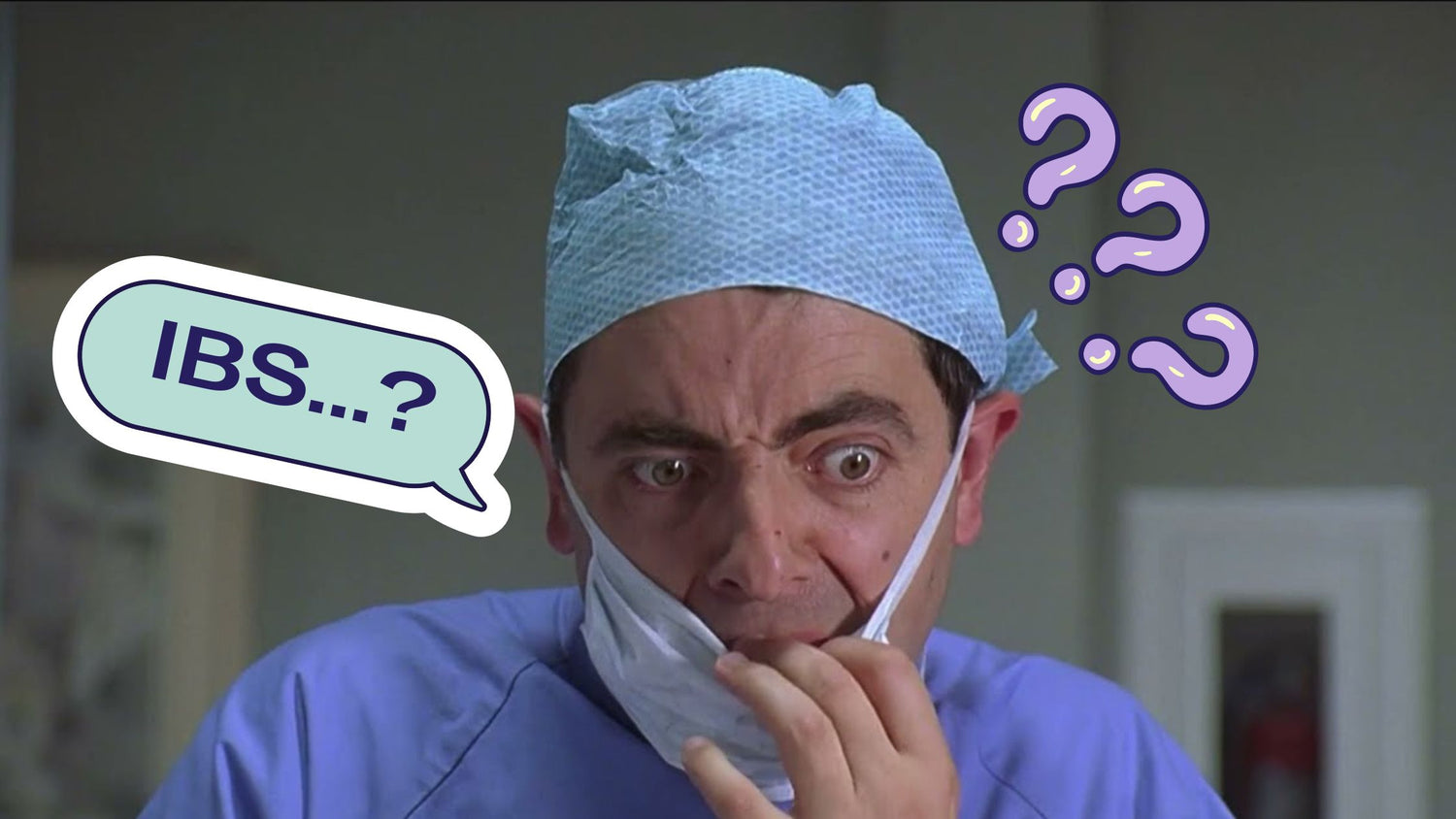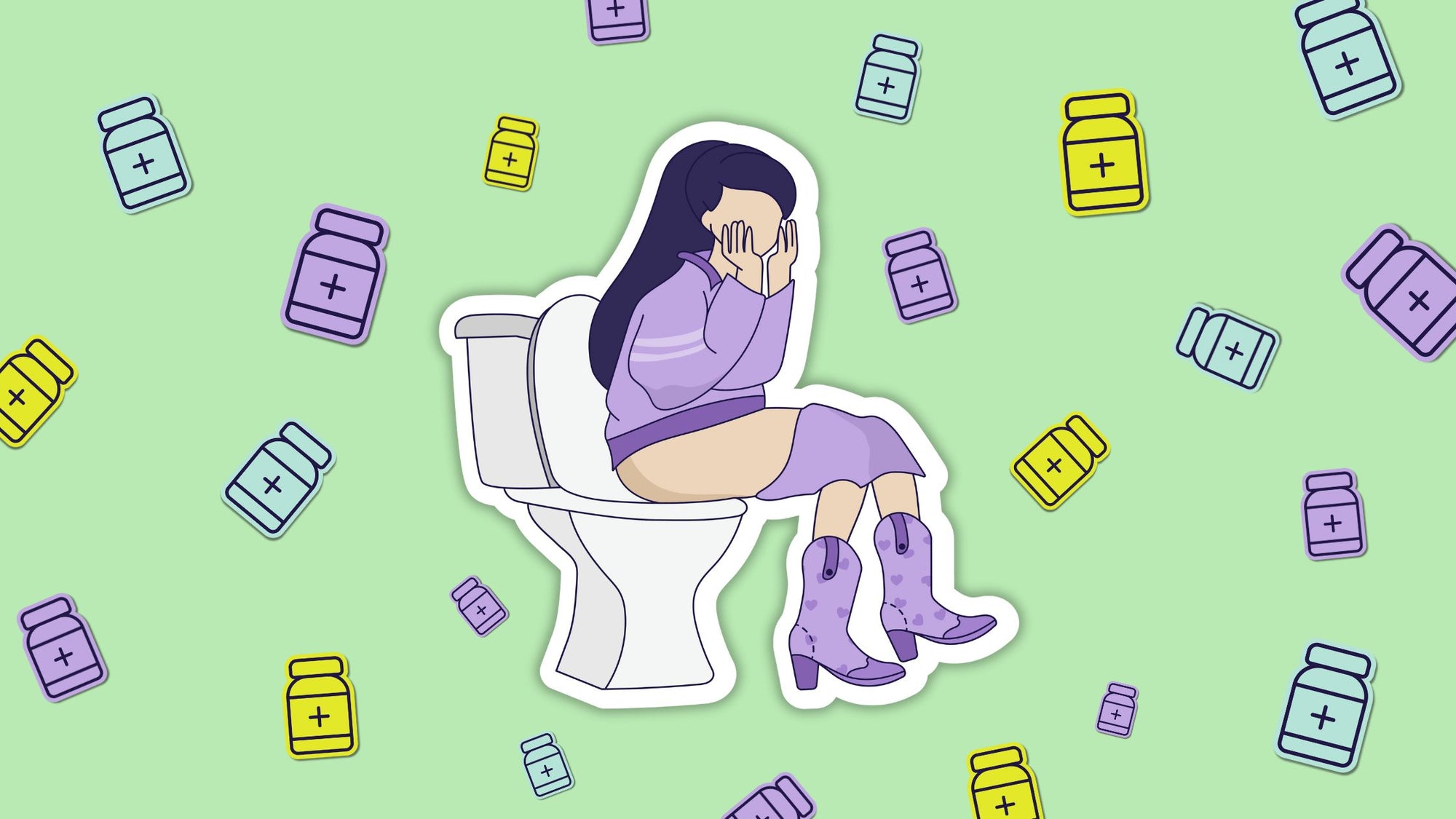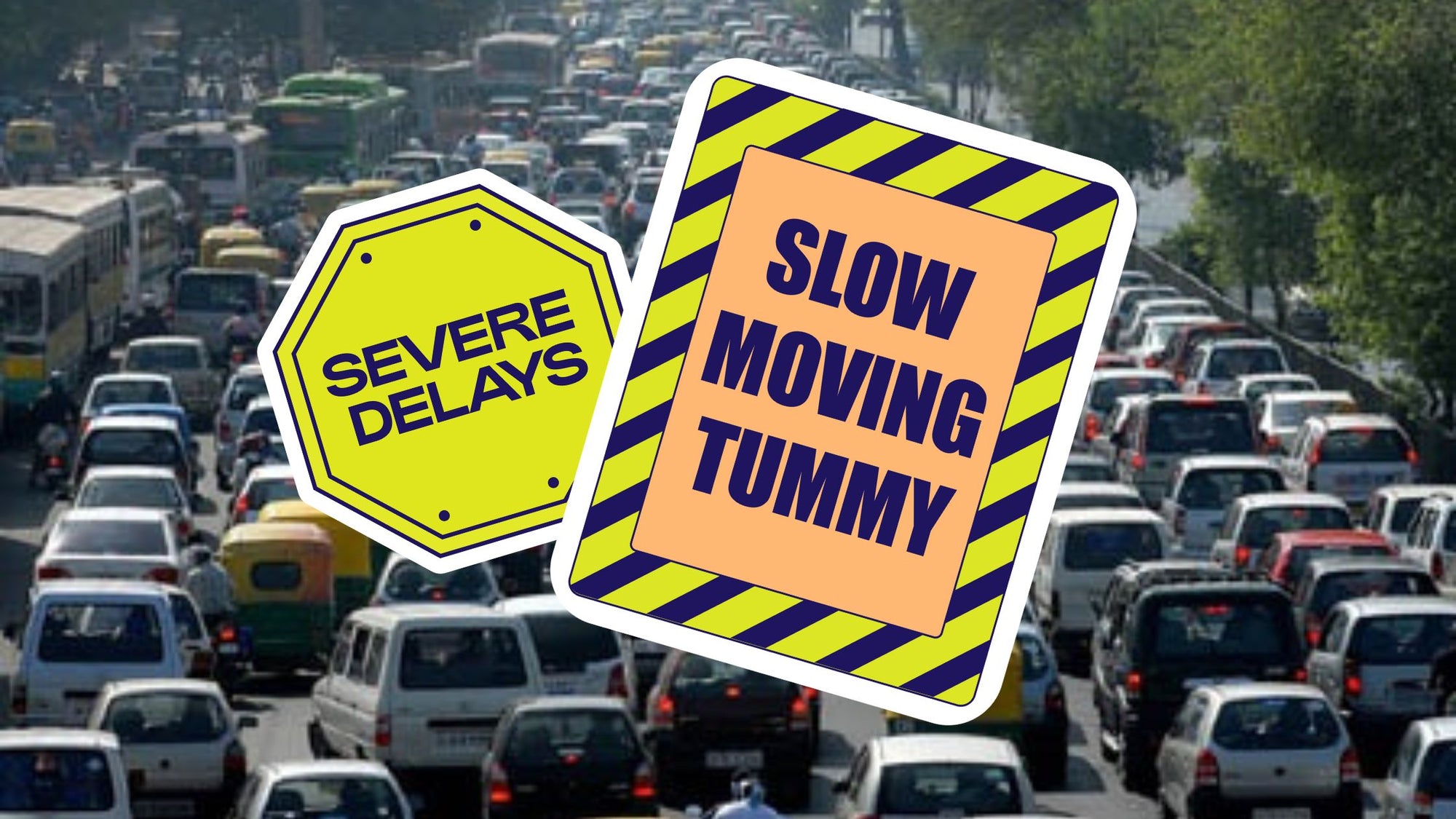Irritable bowel syndrome (IBS) is one of the most common digestive disorders in the world. It affects approximately 10% of the global population to various degrees.
Although IBS is something that many people self-diagnose, there are specific diagnostic criteria for irritable bowel syndrome. Simply getting a bit bloated when you eat a large meal or occasionally getting constipated doesn’t necessarily mean you have IBS!
Of course, we recommend speaking to a medical professional if you’re unsure whether or not you have IBS, as it’s something that needs in-depth diagnostic testing to diagnose and often involves ruling out more serious digestive health issues like inflammatory bowel disease (IBD).
In this article, we’re going to cover everything you need to know about IBS-related bloating and the natural remedies you can use to tackle bloating when you have this digestive disorder.
We will start by covering what IBS is, its symptoms, and how it is diagnosed in a medical setting. We will then finish up with some helpful tips for managing irritable bowel syndrome so you can enjoy some relief if you deal with chronic IBS.
What is IBS?
Irritable bowel syndrome is a gastrointestinal disorder that is chronic (long-lasting) but doesn’t tend to cause any serious long-term health issues or shorten lifespan in any way. IBS can vary in severity between different people. For some, it’s just a minor annoyance that is pretty easy to manage. For others, it significantly impacts their health and disrupts their daily lives.
What Are the Symptoms of IBS?
IBS tends to present with a specific set of symptoms that include abdominal bloating (especially after eating certain trigger foods), abdominal cramps, excess gas (leading to lots of burping and farting), and either constipation, diarrhoea, or a mixture of both.
Those who deal with ongoing constipation as a result of their irritable bowel syndrome diagnosis have IBS-C (the C stands for constipation). Those with frequent bouts of diarrhoea have IBS-D (with the D standing for diarrhoea), and people who suffer from a combination of both diarrhoea and constipation have mixed IBS, known in short as IBS-M.
The causes of IBS, whether it’s IBS-D, IBS—C, or IBS-M are largely unknown. There are lots of hypotheses as to what causes irritability and inflammation in the bowels, but we don’t have a solid answer yet. Hopefully, in the future, research can confirm the root causes of IBS for certain.
However, in the meantime, the current speculations as to what leads to IBS and its associated symptoms include:
- Changes in gut permeability, leading to increased inflammation in the lower digestive tract
- Changes in the gut microbiome composition, leading to poor gut health and nutrient absorption
- Autoimmunity
- Hypersensitivity to certain nutrients or food components
- Infections in the gut
- Other intestinal disorders, such as inflammatory bowel disease
- Cancers in the digestive tract
How is IBS Diagnosed?
The diagnosis of irritable bowel syndrome often involves ruling out other conditions. Healthcare professionals may perform various tests to rule out inflammatory bowel disease, coeliac disease, and bowel cancer, all of which can cause similar symptoms to IBS. Such diagnostic tests might include a colonoscopy, blood samples, and intestinal biopsies.
As part of the diagnosis of IBS, your doctor might also ask you questions about your bowel habits. One of the key criteria used to diagnose IBS is a change in bowel habits that has lasted six months or more. This change may be a shift towards constipation, diarrhoea, or a mixture of both.
Your doctor might also ask about your family history. If one of your parents or older siblings suffers from IBS, you’re more likely to also develop this digestive condition, unfortunately.
Tips to Manage IBS Symptoms
If you deal with irritable bowel syndrome and want some helpful tips to manage it more effectively, look no further! Below, we’ve got some top management strategies for keeping your IBS in check and keeping symptoms at bay.
Avoid Trigger Foods
For many people, IBS is worsened by certain foods, known as trigger foods. Common trigger foods include:
- Foods that are high in saturated fat, such as junk foods, takeaways, and deep-fried foods
- Dairy products, including milk, cheese, and cream
- Beans and legumes, including all kinds of beans, chickpeas, and lentils
- Sugary fruits, such as apples, pears, and watermelon
- Cruciferous vegetables like cauliflower and broccoli
- Green leafy vegetables, including Brussels sprouts, kale, and spinach
- Onions and garlic
- Spicy foods, such as those that contain chilis
- Sugary snacks, including cakes, cookies, biscuits, and pastries
- Artificial sweeteners, including those that contain aspartame and sugar alcohols like xylitol, sorbitol, and mannitol
Adopt a Low FODMAP Diet
Many of the foods that those with irritable bowel syndrome are recommended to avoid are high in FODMAPs, which are types of sugars. FODMAP stands for fermentable oligosaccharides, disaccharides, monosaccharides, and polyols.
In healthy individuals with a diverse and well-balanced gut microbiome, FODMAPs are broken down efficiently. However, in those with IBS, the gut microbiome can become unbalanced, and the levels of beneficial bacteria that normally break down dietary carbohydrates become depleted.
When there are fewer beneficial gut bacteria, FODMAPs take much longer to metabolise than usual. The longer they are sitting in your gut, the more fermentation the sugars undergo. Fermentation is a process that causes the production of gas, so increased fermentation due to slower digestion can lead to bloating, excess flatulence, and abdominal cramps for this reason.
Cutting back on FODMAP can minimise unwanted fermentation and reduce the severity and frequency of your IBS symptoms. FODMAP foods to avoid if you suffer from irritable bowel syndrome include those that contain wheat, rye, dairy, onions, garlic, apples, bananas, pears, watermelon, avocados, cauliflower, green beans, and food containing high fructose corn syrup (this isn’t an exhaustive list!).
Take a Probiotic Supplement
Probiotic bacteria form a large part of your gut microbiome, and they are the beneficial bacteria that we spoke about just above. These bacteria include Bifidobacterium and Lactobacillus, and they help with various process in your colon, including the production of short chain fatty acids and vitamins B12 and K, fermentation of carbohydrates, and immunity.
Taking a probiotic supplement can support your body’s endogenous (natural or internal) probiotic bacteria and help you maintain great gut health. In turn, taking a probiotic supplement each day, such as our Wild Dose supplement, A Dose For Bloating, can relieve digestive symptoms and aid in the management of IBS.
A Dose For Bloating contains two billion probiotic bacteria, seven digestive enzymes, and seven plant extracts in a bloat-busting capsule. Just one capsule a day is all you need to keep your IBS-related bloating and gas away!
Practice Effective Stress Management
Stress can contribute to IBS symptoms by slowing down gut motility, disrupting digestive processes, and increasing inflammation. When you’re stressed, it causes the brain to signal to the adrenal glands to produce cortisol and adrenaline.
Elevated cortisol causes blood to be diverted away from the gut and towards the skeletal muscles in case you need to run away from danger. Because of this, your digestion slows down, your body becomes less efficient at metabolising ingested foods, and you’re more likely to experience digestive issues.
Managing your stress with effective techniques like deep breathing, meditation, journaling, yoga, and gentle exercise can support a healthy digestive system. Stress management can, therefore, be effective as part of the management plan for irritable bowel syndrome.
Try Natural Herbs and Spices to Relieve Bloating
There are lots of herbs and spices that are known natural remedies for bloating. Consuming more of these herbs and sounds in your diet can be effective in managing the bloating and gas caused by IBS.
The best herbs and spices for relieving bloating include chamomile, cinnamon, cumin, dill, fennel, ginger, mint, parsley, peppermint, turmeric, and thyme. They contain compounds that are known to support digestion, reduce inflammation, and eliminate oxygen free radicals that can cause damage to various cells within the body.
Consider dropping some fresh herbs up and stirring them into your main meals, having herbal teas, drinking a turmeric latte, or making home-made gingerbread biscuits to increase your intake of gut friendly compounds.
Drink Plenty of Water
One of the most effective natural remedies for IBS is found in your tap (or in a plastic bottle at the supermarket)! Water does wonders for the gastrointestinal tract, and it’s essential for healthy digestive processes.
Water helps soften the stool and prevent constipation. It also enhances gut motility, meaning food moves more efficiently through the intestines and won’t get fermented to necessary amounts by your gut bacteria. Therefore, drinking plenty of water throughout the day can reduce the symptoms of bloating, gas, constipation, and abdominal cramps.
Take a Digestive Enzyme Supplement
Digestive enzymes are found naturally in the body, and they’re secreted in response to ingested food. However, inadequate production of these important enzymes can lead to digestive issues and exacerbate unwanted symptoms like gas, bloating, and constipation.
Taking a digestive enzyme supplement, such as A Dose For Bloating, can support your endogenous production of these enzymes and ensure efficient digestion. When your body is able to break down the foods you eat efficiently, you can reduce the nasty effects of IBS.
Get Medications from a Healthcare Professional
If natural remedies aren’t working very well for you, medications might be a suitable alternative.
It’s important to speak with a qualified healthcare professional if you decide to start taking medications to manage your IBS, as they will know which drugs are the most suitable for you based on your medical history and current health status. They will also be the ones who can prescribe these medications, as many IBS treatments aren’t available over the counter.
IBS may be medically managed with antispasmodics like Mebeverine, laxatives like Macrogol or Laxido if you suffer from constipation, and anti-diarrhoeals, such as Loperamide, if you have loose stools.
Avoid Consuming Excessive Amounts of Tea and Coffee
As delicious as tea and coffee are, they aren’t always ideal drinks to choose when you have irritable bowel syndrome. They contain caffeine, a compound that is known to affect the digestive system quite significantly.
Caffeine can stimulate the smooth muscle in the colon, increasing gut motility and potentially causing diarrhoea. It can also cause abdominal cramps in those who are particularly sensitive to it.
A cup of caffeinated tea or coffee a day should be okay, but we recommend limiting your intake to no more than 200 mg a day when you have IBS. A standard cup of coffee contains around 200 mg, so if you want any additional hot drinks during the day, choose decaffeinated options to avoid digestive disturbances.









